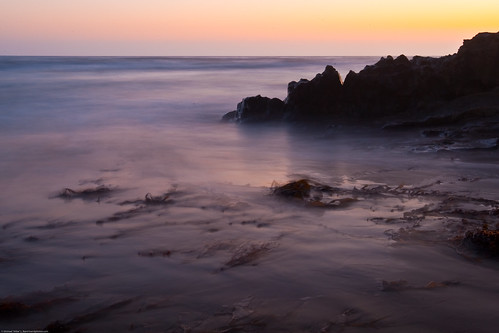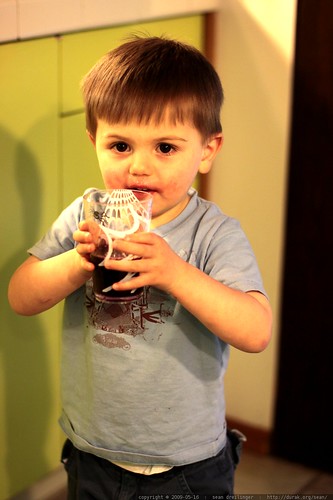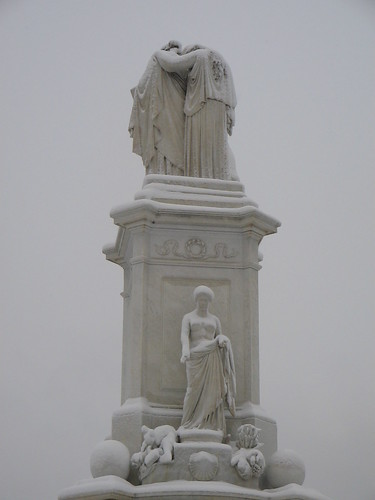To the Lighthouse by Virginia Woolf
the monotonous fall of the waves on the beach, which for the most part beat a measured and soothing tattoo to her thoughts seemed consolingly to repeat over and over again as she sat with the children the words of some old cradle song, murmured by nature, ‘I am guarding you—I am your support," but at other times suddenly and unexpectedly, especially when her mind raised itself slightly from the task actually in hand, had no such kindly meaning, but like a ghostly roll of drums remorselessly beat the measure of life, made one think of the destruction of the island and its engulfment in the sea, and warned her whose day had slipped past in one quick doing after another that it was all ephemeral as a rainbow—this sound which had been obscured and concealed under the other sounds suddenly thundered hollow in her ears and made her look up with an impulse of terror.
To the Lighthouse and Mrs Dalloway were the first books of Woolf's I ever read. I don't remember which came first (I believe it was To the Lighthouse), but I remember the contrast in my experience of them. Mrs Dalloway was dark, far away, it did no seem to wish me to come in. As a book, it was forbidding and self-contained, a fortress of a book, filled I was sure with something beautiful, something which I could smell and hear at times, but which I was forbidden to see, simply because I was not worthy of the experience. (I've since peeked my eyes just over the fortress wall, mind you, but nonetheless...).
To the Lighthouse was none of these things. It was inscrutable perhaps, yes, but not inscrutable in the way that the interior of a fortress is, none of the feeling of being kept out of a thing. To the Lighthouse had the inscrutability of the sea - vast, eminently available, explorable, considerable, but nonetheless, unknowable - even as we know it. I feel about To the Lighthouse the way boys in old books felt about the sea: that it is a place where souls are forged, where experiences are had, a place with a certain home-ness to it. To the Lighthouse, like the sea, was a lover, or a harsh mistress. Mrs. Dalloway was a cloud, eminently arrayed but ever out of reach.
Over the past month, it's come to my attention from different people that this is not the normal way of things - that most people feel the opposite way, in fact. I want to tell you what I see in To the Lighthouse, that makes me feel at home - unavoidably my little essay will fail, because the very reason that the book is inscrutable is because the experience of immensity is supposed to be indescribable. That is, I guess, what makes it immense. But, I will have, at least, made the attempt.
For me, To the Lighthouse is a book about inbetween places and people. The lighthouse itself is a perfect example of this - it is a building that is at once of the sea and the sky, built on land that barely exists. It clings to earth - it is immersed in sea and sky. The house has a similar story, particularly in the second part, when it is invaded by the sand and the wind, and starts to decay - before being put aright again by the servants. Mrs Ramsay herself is, in many ways, the same sort of symbol - at once her hands are in the practical world, of raising children and worrying over molehills, of setting up love matches and entertaining guests, while her mind, at a moments notice, is lost in the immensities of thought, ranging over the great questions of philosophy with an easy authenticity that paints the efforts of her husband, or Charles Tannsley as what they are - gropings, accidental spelunkings obtained in pursuit of other ends. The towers of this novel are immensely tied into this to me, into this balance between the great and sensual sea, and the immensity of the sky.
Of course, I know that sounds like a kind of paragraph of nonsense, but there is a reason, for me, that it isn't. The lighthouse, the house, Mrs Ramsay (for everyone but herself), the sea, the sky, the tidal regions of the beach, all these twilit places would seem to tease an obvious question - what do they mean? OR to solidify the question more - these things are like life, halfway between the heavens and the grave, and inevitably bound for one or the other (or both, depending on your philosophy). Humans are, after all, this strange mixture of the sensual and the spiritual, and for eons, man has over and over asked the question - why? Why are we here? Why are we what we are? What are we, eminent strugglers, supposed to struggle against?
I think, though, in To the Lighthouse, this is a deceptive question: the very central point of the book, for me, is that the answer doesn't really matter. Asking the purpose of life is like asking the purpose of the sea, or the purpose of a painting, or the purpose of a child. They are things that simply are.
This may sound like simple old-fashioned Atheism - in a sense it is. It is and it isn't. The character of Charles Tansley shows this - he is the 'quintessential atheist' of the book (I put this in quotes because I don't mean to imply that atheists are like this, or like that, simply that the literary IDEA of an atheist is like Charles Tansley). Charles doesn't believe in nothing, rather he believes in believing in nothing. He believes there is no God, whereas the novel simply doesn't bother believing there is a God - or that there isn't. It accepts that there is a world, that is is here, that we are here, that we will die, and other people will live, that none of will accomplish immortality, and then gently, gently, ever so gently, whispers to us that we will live in it anyway. Like Mrs Ramsey, sometimes that will terrify us, sometimes it will comfort us. And that's okay, and there is no answer that will resolve it for us. In a world with no particular purpose, we must define our own, and we can never be wrong - and we can never be right. We simply will all live, try to do things we think are good, try not to do what we think is bad, and then, one day, we will die. We will paint, or write, or fix computers, and perhaps we'll be remembered for a very long time, or perhaps barely a moment, but eventually, we'll be forgotten. Our happiness will not last, but we will, in spite of that - or maybe because of that - be happy for our moment.
From her hand, ice cold, held deep in the sea, there spurted up a fountain of joy at the change, at the escape, at the adventure (that she should be alive, that she should be there). And the drops falling from this sudden and unthinking fountain of joy fell here and there on the dark, the slumbrous shapes in her mind; shapes of a world not realised but turning in their darkness, catching here and there, a spark of light; Greece, Rome, Constantinople."Read More......
"Yes, she thought, laying down her brush in extreme fatigue, I have had my vision."

















